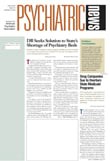“Oops.” That was the opening of the August 13 Albany Times Union editorial about the privacy regulations issued by the Department of Health and Human Services (HHS) last month (Psychiatric News, September 6).
A sampling of editorials and opinion pieces reveals dismay about the weakening of the regulations from those proposed by the Clinton administration and concern about pharmacists’ use of medical information to market medical products.
The opinions appeared in the daily health policy reports at www.kaisernetwork.org, an electronic news service.
The unsigned editorial in the Albany Times Union went on to say that HHS Secretary Tommy Thompson “invokes a scenario of the sick and ailing [required] to run through bureaucratic hoops to resolve the necessary consent before getting medical care.”
The assertion, the editorial argues, “would be a more credible one, surely, if it came from patients’ rights groups, say, or from consumer advocates,” who are instead arguing that the White House has “sided with health maintenance organizations.”
Robert Sobel, a senior research associate at the Harvard Medical School, wrote in an opinion piece in the August 23 Los Angeles Times, “Bush has severely undercut medical privacy. . . .The health of Americans and the body politic is at risk.”
He argued that as a result of the weakness in the regulations, patients will become “even warier” about sharing symptoms, and physicians will have to “practice more defensive medicine.”
An editorial in the August 15 Los Angeles Times criticizes two of what it termed “Thompson’s tweaks.”
“The first,” according to the editorial, “grants an alarmingly fuzzy group—health care operators—nearly as much access to patient records as medical researchers.”
The second permits pharmaceutical companies to pay pharmacists to recommend that a patient switch from one drug to another and to send product mailers to customers with a particular illness.
The editorial, however, said that the “mild protections are an improvement over the current anything-goes system.”
An editorial in the August 18 Boston Globe also criticized the provision that permits a pharmaceutical company to pay a pharmacist to identify potential customers and write to persuade them to shift from one medication to another.
The August 17 Milwaukee Journal Sentinel called the rules “a good-faith effort by the government to balance the need for privacy with the need for open communication.”
The editorial claimed that under the Clinton privacy rule, “the paperwork that distracts and torments virtually every doctor in the country would have become even more cumbersome.”
APA President Paul Appelbaum, M.D., told Psychiatric News, “Every newspaper in the country would be editorializing against the regulations if the editorial boards understood their full import. Instead, we are seeing the success of the administration’s strategy of releasing these critical regulations late on a Friday afternoon in August. By Monday, their impact was all but forgotten, except by a handful of newspapers. This is not the way a democracy should make public policy.” ▪
